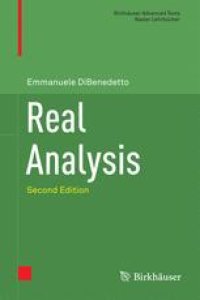
Ebook: Real Analysis
Author: Emmanuele DiBenedetto (auth.)
- Tags: Measure and Integration, Calculus of Variations and Optimal Control, Optimization, Partial Differential Equations, Approximations and Expansions, Applications of Mathematics
- Series: Birkhäuser Advanced Texts Basler Lehrbücher
- Year: 2016
- Publisher: Birkhäuser Basel
- Edition: 2
- Language: English
- pdf
The second edition of this classic textbook presents a rigorous and self-contained introduction to real analysis with the goal of providing a solid foundation for future coursework and research in applied mathematics. Written in a clear and concise style, it covers all of the necessary subjects as well as those often absent from standard introductory texts. Each chapter features a “Problems and Complements” section that includes additional material that briefly expands on certain topics within the chapter and numerous exercises for practicing the key concepts.
The first eight chapters explore all of the basic topics for training in real analysis, beginning with a review of countable sets before moving on to detailed discussions of measure theory, Lebesgue integration, Banach spaces, functional analysis, and weakly differentiable functions. More topical applications are discussed in the remaining chapters, such as maximal functions, functions of bounded mean oscillation, rearrangements, potential theory, and the theory of Sobolev functions. This second edition has been completely revised and updated and contains a variety of new content and expanded coverage of key topics, such as new exercises on the calculus of distributions, a proof of the Riesz convolution, Steiner symmetrization, and embedding theorems for functions in Sobolev spaces.
Ideal for either classroom use or self-study, Real Analysis is an excellent textbook both for students discovering real analysis for the first time and for mathematicians and researchers looking for a useful resource for reference or review.
Praise for the First Edition:
“[This book] will be extremely useful as a text. There is certainly enough material for a year-long graduate course, but judicious selection would make it possible to use this most appealing book in a one-semester course for well-prepared students.”
—Mathematical Reviews